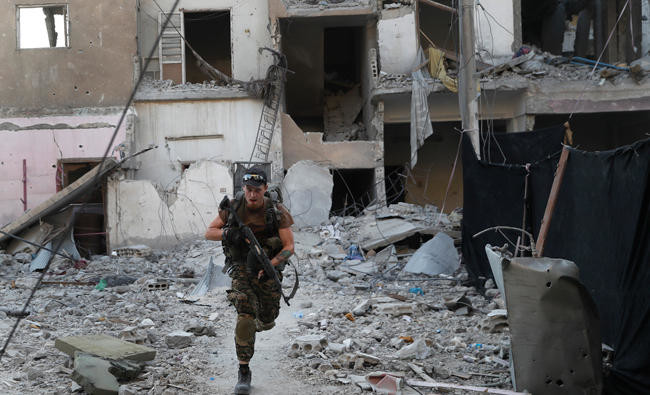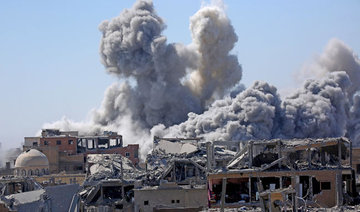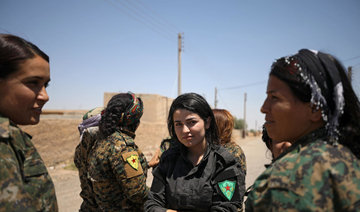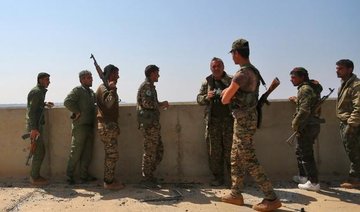BEIRUT: Syrian fighters backed by US special forces battled Thursday to clear the last remaining Daesh militants holed up in their crumbling stronghold of Raqqa.
Most of Raqqa, long a byword for the militants’ most gruesome atrocities, is now in the hands of US-backed fighters supported by waves of heavy air strikes by a military coalition led by Washington.
“The Syrian Democratic Forces and American special forces began a mopping up operation in Raqqa,” the Syrian Observatory for Human Rights said Thursday.
The Britain-based monitor said militant holdouts were still hiding in underground shelters in a part of the city center where a football stadium and former government buildings are located.
But the operation was being slowed down by large numbers of mines planted by the militants in the city, where they have been under siege for three months, it said.
The extremists seized Raqqa in early 2014, making it their de facto Syria capital. They are thought to have used the city to plan attacks abroad.
On Wednesday the SDF said they were in the “final stages” of capturing Raqqa as the Observatory said the US-backed fighters controlled 90 percent of the northern city.
The US-led coalition supporting the SDF estimated that 65-70 percent of Raqqa was under the control of the alliance of Kurdish and Arab fighters.
Across the border In Iraq, security forces backed by paramilitary units launched a dawn assault on a besieged Daesh-held pocket around the northern town of Hawija, just days after attacking the jihadists’ only other foothold in the country.
The territory still held by Daesh has been dwindling fast since its defeat in Iraq’s second city Mosul in July, with stronghold after stronghold coming under assault on both sides of the border with Syria.
Iraqi Prime Minister Haider Al-Abadi predicted the assault on the Hawija region would swiftly bring a new victory against the crumbling jihadists.
After the defeat of Daesh in Mosul and the recapture of adjacent areas, Hawija and neighboring towns form the last enclave still held by Daesh in Iraq apart from a section of the Euphrates Valley downstream from the border with Syria.
“Greetings to all of our forces, who are waging several battles of liberation at the same time and who are winning victory after victory and this will be another, with the help of God,” Abadi said.
An AFP correspondent heard heavy shelling around the Daesh-held town of Sharqat where Iraqi forces have been massing in recent days.
The US-led coalition fighting Daesh hailed the new offensive by the Iraqi security forces against the jihadist group.
“Daesh is losing ground and failing in every battle. Soon ISIS will have no sanctuary in Iraq,” said coalition spokesman Col. Ryan Dillon.
Humanitarian organizations expressed concern for the fate of civilians caught up in the offensive.
“The 85,000 civilians still in and around Hawija, including around 40,000 children, now face a terrifying time as they worry about getting caught up in the fighting or being hit by an air strike,” said International Rescue Committee acting country director Jason Kajer.
“For those who decide to flee, there is a significant risk of being targeted by Daesh snipers or killed by a mine.”
In Syria, tens of thousands of civilians have fled the Raqqa fighting in recent months but thousands are still trapped inside the city according to the UN’S Office for the Coordination of Humanitarian Affairs (OCHA).
“We now estimate that up to 15,000 civilians remain trapped in Raqqa city, although exact figures remain difficult to verify due to the situation on the ground,” OCHA’s Linda Tom told AFP.
She said the civilians, many of them women and children, “are facing incredibly difficult conditions,” including food, water and medical shortages.
Daesh has seen the territory under its control fast diminish in recent months in the face of multiple offensives against its fighters in both Iraq and Syria.
On Tuesday, Iraqi forces launched an attack up the Euphrates Valley against the other one of Daesh’s two remaining enclaves in Iraq.
And in Syria’s eastern province of Deir Ezzor, IS faces twin assaults — one by Russian-backed government troops and the other by SDF fighters.
Daesh also holds pockets of territory elsewhere in Syria, notably in eastern parts of the central provinces of Homs and Hama, but it has come under attack by Russian-backed government forces there too.


US-backed force ‘mopping up’ last Daesh holdouts in Raqqa
US-backed force ‘mopping up’ last Daesh holdouts in Raqqa

Sudanese nomads trapped as war fuels banditry and ethnic splits

- War disrupts nomads’ traditional routes and livelihoods
- Nomads face threats from bandits as well as ethnic tensions
NEAR AL-OBEID: Gubara Al-Basheer and his family used to traverse Sudan’s desert with their camels and livestock, moving freely between markets, water sources, and green pastures. But since war erupted in 2023, he and other Arab nomads have been stuck in the desert outside the central Sudanese city of Al-Obeid, threatened by marauding bandits and ethnic tensions. The war between the Sudanese army and the paramilitary Rapid Support Forces (RSF) has left nearly 14 million people displaced, triggered rounds of ethnic bloodshed, and spread famine and disease. It has also upset the delicate balance of land ownership and livestock routes that had maintained the nomads’ livelihoods and wider relations in the area, local researcher Ibrahim Jumaa said. Al-Obeid is one of Sudan’s largest cities and capital of North Kordofan state, which has seen the war’s heaviest fighting in recent months. Those who spoke to Reuters from North Kordofan said they found themselves trapped as ethnic hatred, linked to the war and fueled largely online, spreads.
“We used to be able to move as we wanted. Now there is no choice and no side accepts you,” al-Basheer said. “In the past there were a lot of markets where we could buy and sell. No one hated anyone or rejected anyone. Now it’s dangerous,” he said.
RISK OF ROBBERY
As well as the encroaching war, the nomads — who Jumaa said number in the millions across Sudan — face a threat from bandits who steal livestock.
“There are so many problems now. We can’t go anywhere and if we try we get robbed,” said Hamid Mohamed, another shepherd confined to the outskirts of Al-Obeid. The RSF emerged from Arab militias known as the Janjaweed, which were accused of genocide in Darfur in the early 2000s. The US and rights groups have accused the RSF of committing genocide against non-Arabs in West Darfur during the current conflict, in an extension of long-running violence stemming from disputes over land. The RSF has denied responsibility for ethnically charged killings and has said those responsible for abuses will be held to account. Throughout the war the force has formed linkages with other Arab tribes, at times giving them free rein to loot and kidnap.
But some Arab tribes, and many tribesmen, have not joined the fight.
“We require a national program to counter hate speech, to impose the rule of law, and to promote social reconciliation, as the war has torn the social fabric,” said Jumaa.
“We used to be able to move as we wanted. Now there is no choice and no side accepts you,” al-Basheer said. “In the past there were a lot of markets where we could buy and sell. No one hated anyone or rejected anyone. Now it’s dangerous,” he said.
RISK OF ROBBERY
As well as the encroaching war, the nomads — who Jumaa said number in the millions across Sudan — face a threat from bandits who steal livestock.
“There are so many problems now. We can’t go anywhere and if we try we get robbed,” said Hamid Mohamed, another shepherd confined to the outskirts of Al-Obeid. The RSF emerged from Arab militias known as the Janjaweed, which were accused of genocide in Darfur in the early 2000s. The US and rights groups have accused the RSF of committing genocide against non-Arabs in West Darfur during the current conflict, in an extension of long-running violence stemming from disputes over land. The RSF has denied responsibility for ethnically charged killings and has said those responsible for abuses will be held to account. Throughout the war the force has formed linkages with other Arab tribes, at times giving them free rein to loot and kidnap.
But some Arab tribes, and many tribesmen, have not joined the fight.
“We require a national program to counter hate speech, to impose the rule of law, and to promote social reconciliation, as the war has torn the social fabric,” said Jumaa.
© 2026 SAUDI RESEARCH & PUBLISHING COMPANY, All Rights Reserved And subject to Terms of Use Agreement.












